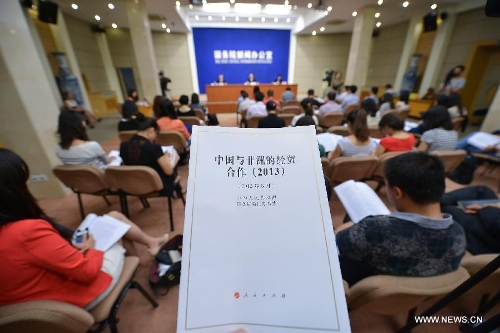Africa investment to widen

Photo taken on a press conference shows a white paper on China-Africa Economic and Trade Cooperation issued by Chinese government, in Beijing, China, Aug. 29, 2013. The white paper, released by the Information Office of China's State Council, underlines latest achievements of the mutually-beneficial cooperation between China and African countries. (Xinhua/Li Xin)
China is striving to diversify its investment in Africa as the two sides have seen robust growth in trade despite a sluggish global economic recovery in recent years, said a government white paper released Thursday.
In a bid to improve the quality of the investment, China has been developing manufacturing, service and agricultural sectors as new highlights of China-Africa cooperation, the paper said.
China has now become Africa's largest trade partner, and Africa is now a major source of China's imports, the white paper released by the Information Office of China's State Council said Thursday.
In 2012, the total volume of China-Africa trade reached $198.5 billion, a year-on-year growth of 19.3 percent, it said.
The strong intrinsic demand for Chinese products in Africa and the different levels of economic development between China and Africa provide a driving force for the booming trade and investment between China and Africa, Vice Minister of Commerce Li Jinzao said at the release of the paper.
China's direct investment in Africa rose to $2.52 billion in 2012 from $1.44 billion in 2009, with an annual growth of 20.5 percent, it said.
Investment in mining still accounted for a large share of China's direct investment in Africa but China is striving to diversify this investment, the paper showed.
Currently, over 2,000 Chinese enterprises have invested in more than 50 African countries and regions, covering industries such as traditional agriculture, mining, construction, resource product processing, industrial manufacturing, finance, commercial logistics and real estate, it showed.
"Africa has rich mining resources but lacks capital and technology. China invested a lot in mining in Africa to help it translate its advantage in resources into real growth opportunities. It's normal and offers no cause for much criticism," Zhao Yongsheng, a visiting scholar with the Institute of European Studies at the Chinese Academy of Social Sciences, told the Global Times Thursday.
"The fact that China is currently diversifying its investments in Africa shows it is not just eyeing Africa's resources, but rather seeing the long term potential in its economic and trade cooperation with Africa," Zhao said.
Manufacturing is a key area of China's investment in Africa, with total investment reaching $1.33 billion in the 2009-2012 period, the paper said.
The paper also showed service sectors that produce no pollution and consume little energy have become a new highlight of China-Africa cooperation in recent years.
By the end of 2012, China's direct investment in Africa's financial sector had totaled $3.87 billion, accounting for 17.8 percent of its total investment in Africa, the paper said.
"China's assistance to Africa is becoming more and more focused on mutual benefits and win-win instead of pure political assistance as in the past. Instead of unilaterally exporting goods, China increasingly aims to foster new growth points in African countries," Zhao Yumin, a research fellow at the Chinese Academy of International Trade and Economic Cooperation (CAITEC), told the Global Times Thursday.
China's agricultural exports to Africa grew to $2.49 billion in 2012 from $1.58 billion in 2009, up 57.6 percent.
China's agricultural imports from Africa, most non-food items including cotton, hemp, silk and oilseeds, saw a 146 percent surge in the period.
"Agricultural resources in Africa are also abundant but its agricultural productivity is very low, making it unable to feed its people. It's necessary for China to help Africa secure its food security to combat rising global food prices," Zhao said.
"Amid China's economic slowdown and weak economic recovery in the US and Europe, it's even more necessary for China to expand investment and trade in Africa to release production capacity that cannot be totally absorbed by internal demand," Zhao said.
Wei Yongquan, general manager of Huajian Group, a Chinese footwear manufacturer, told the Global Times Thursday in Ethiopia that the group had set up an overseas factory in Ethiopia in early 2012 after it closed its only overseas factory in Vietnam. "Unemployment is high in Africa so it means its labor resources are rich. Deep processing of leather is underdeveloped in Ethiopia and we help fill the gap," Wei said.
Wei's factory employs more than 2,700 local people. Wei expected to achieve $20 million in sales in the group's Ethiopian factory by the end of 2013 and $40 million in 2014.
Full Text: China-Africa Economic and Trade Cooperation (2013) (1)
Full Text: China-Africa Economic and Trade Cooperation (2013) (2)
Full Text: China-Africa Economic and Trade Cooperation (2013) (3)
Full Text: China-Africa Economic and Trade Cooperation (2013) (4)
Full Text: China-Africa Economic and Trade Cooperation (2013) (5)
Full Text: China-Africa Economic and Trade Cooperation (2013) (6)
Full Text: China-Africa Economic and Trade Cooperation (2013) (7)
Full Text: China-Africa Economic and Trade Cooperation (2013) (8)
Full Text: China-Africa Economic and Trade Cooperation (2013) (9)